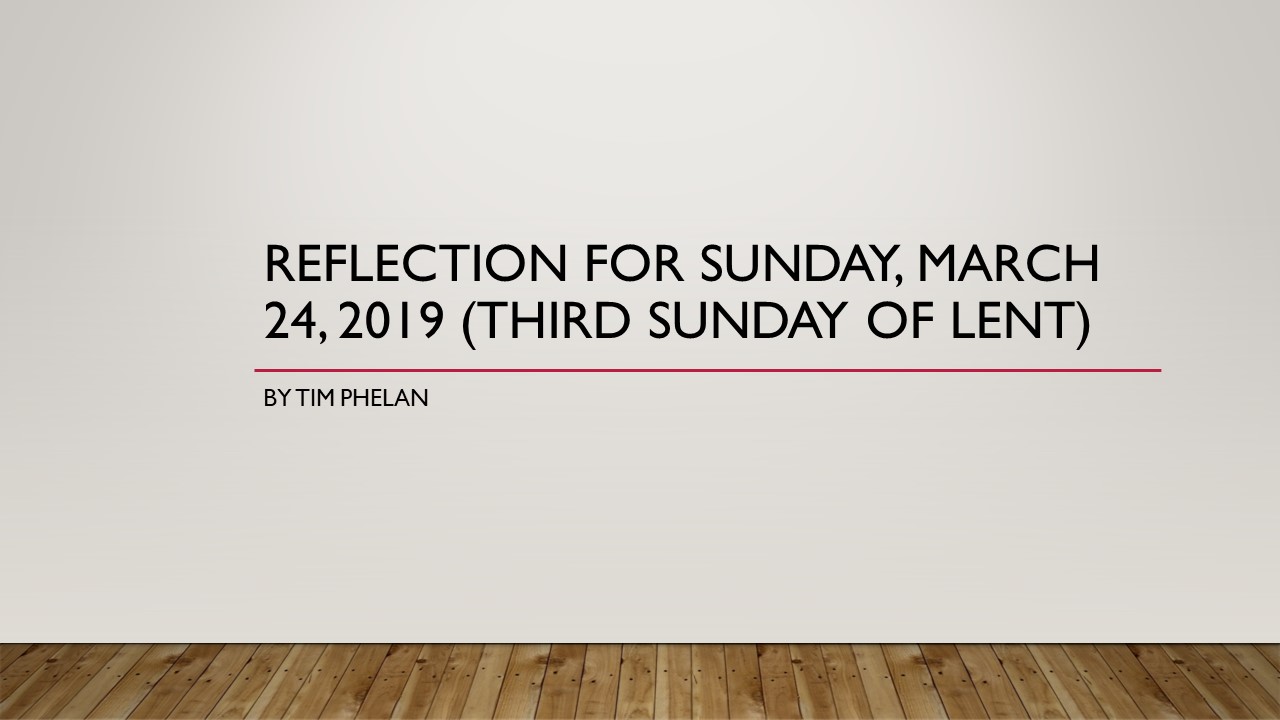Sunday bulletin for April 28, 2019


Sunday bulletin for April 28, 2019


Sunday bulletin for April 14, 2019

Sunday bulletin for April 7, 2019

Reflection for Sunday, March 31, 2019 (Fourth Sunday of Lent) by Joan O’Connell
This week-end’s Scripture readings speak about sight, and seeing, as well as the failure to see.
The First Reading from Samuel points out that God does not see in the same way we do, based on appearances. He sees into our hearts, our true selves, not the image that we project or that we project onto others. In the reading, it almost seems as if David was invisible to his father – when Jesse was asked to bring forth his sons, it was only after prompting that he remembered David, the youngest, who was off tending the sheep. As the youngest, what could he possibly have to offer compared to his older brothers? However, God saw something special in David that no one else seemed to perceive.
Have you ever felt that way yourself – that people don’t see the whole you and have slotted you into one particular role? If you’ve ever been pigeon-holed at work, it can be hard to break out of that mold that others have made for you. It can be incredibly frustrating because you know you have more to offer. Sometimes the only solution is to change jobs, or do something out of “character”, before your full dimensions come to be seen.
In the Gospel, some of the community and the religious authorities were so locked into their points of view, that they refused to believe that the blind man was able to see, despite all the evidence to the contrary. They discounted his own testimony and were reluctant to believe even that of his parents and neighbours who knew him. How ironic that they justified their own blindness by arguing about the sight of a man who had been blind but was no longer. It was easier for them to just invalidate the source of all this trouble – Jesus – than to have to shake up their firmly-held points of view about worthiness, godliness and right and wrong.
When I view the world, my first perspective is as a white, Canadian born woman of English/Irish heritage who is middle-class, married with grown children and Catholic. In a way, I can’t help but see things through this lens because that is who I am. But change any one of those characteristics and it necessarily changes the perspective, the lens. If you were to substitute Syrian born for Canadian born, how different would my life experience be and how different then the way I would view the world. I might be newly arrived in Canada and wondering if I can adapt to so many new things and if will I ever see my family and homeland again. And I wonder how differently you might see me.
Since we can’t help who we are, how might we, if we are willing, improve our vision, broaden the lens through which we see? Pope Francis says we can start to do this through a culture of encounter. It is through meeting and interacting with people different from ourselves and by walking in another’s shoes that we can see another’s reality, who someone actually is, not just what we have been conditioned to see.
How can we do this? It will likely entail deliberate action on our part to share in the journey of another and see another reality.
Here at St. Joe’s, members of the Reflections ministry each bring their own perspective to the readings when we offer the reflection each week. We are male and female, young and not-so-young, gay and straight, educators, health care providers, lawyers, parents, clergy and retired public servants.
An alternative lens I often look through and draw on when preparing a reflection is as a member of Development and Peace – Caritas Canada. That’s the international solidarity and social justice organization of the Canadian Catholic church. I look on Development and Peace as an alternative pair of glasses that the bishops of Canada created for us over 50 years ago.
In 2008, when I had just retired, I went on an exposure trip with Development and Peace to Ecuador. It offered me a different perspective and changed many of my points of view. I travelled with fellow Development and Peace members and we met many of the partner groups of Development and Peace as well as the people they served, mostly indigenous Kichwa women and men who lived in the high Andes. We learned about their lives and struggles, met some of their families, saw their homes and their farms – much different from those here in Canada. I also encountered for the first time another interpretation of the history of the Americas than the one I had been brought up with. I learned about the greed, brutality, discrimination and yes, blindness that was part of bringing so-called civilization and Christianity to the so-called New World.
I haven’t looked at things the same way since and it has influenced how I view our own colonial past and present here in Canada.
I humbly offer Development and Peace to you as a possible way to share in the journey of another and see another perspective.
You may have seen the posters or read the bulletin announcements that the emphasis of the Share Lent campaign this year is sharing in the journey of involuntary migrants. This is the theme that Pope Francis himself asked us to focus on as part of a global campaign within the world-wide Caritas family. It offers the opportunity to see things through a different lens by accompanying the 68.5 million men, women and children who have been forced to flee their homes through no fault of their own.
Development and Peace offers many ways you can share in this journey with them. Some of you have already participated in the Way of the Cross after the 11:30 Mass which continues until the end of Lent. In it, we journey with Jesus towards Calvary through the lens of people who have had to flee their homes because of war, persecution, poverty or environmental or natural disasters.
You can also read the stories in our magazine and other materials of some of the forced migrants that Development and Peace helps to support, through your contributions. You can participate in an actual journey by joining local members and supporters on the solidarity walk next Saturday throughout downtown Ottawa and Gatineau. You can become a member of Development and Peace.
And since next Sunday – the 5th Sunday of Lent – is Solidarity Sunday – the once a year collection in all parishes across Canada for the work of Development and Peace, you might feel inspired to make a contribution next week-end that will enable Development and Peace’s work to continue and thrive.
Our readings today are a good reminder for us, as we journey together through the dark days of Lent towards Good Friday and the light of the Easter, that while everyone of us is on a journey together, we may not always see those who travel the road with us. Development and Peace can be one way that helps us to see this more clearly.

Sunday bulletin for March 31, 2019

Reflection for Sunday, March 24, 2019 (Third Sunday of Lent) by Tim Phelan
The Samaritan woman said to him, “How is it that you, a Jew, ask a drink from me, a woman of Samaria.”
There’s a psychological condition common among law students called “Imposter Syndrome.” We spend so much time around insanely intelligent people who seem to constantly be able to balance work, school, a social life, healthy eating, volunteering…while we’re struggling to get by. In an environment like that, it’s easy for us to wonder if we really belong in law school at all. I know I’ve had my share of “I’m an imposter” moments.
At the beginning of this year, I attended a panel discussion with law professors on mental health run by a club in the faculty. It was here that I learned the secret to overcoming “Imposter Syndrome” – remembering that everyone has it, and everyone is faking it just as much as I am. We all struggle through it together, and no one is immune.
In church, I think its also very easy to experience imposter syndrome. We’re surrounded by good examples of Christianity in the Saints, the Gospel, and in each other. It’s very for us to focus on our shortcomings, on the things we’ve done wrong this week, that we fail to see the good. Often, we may wonder if we’re worthy of being called “Christians” or whether we’re worthy of our relationship with Christ.
In today’s Gospel, Jesus is sending us a message: we are worthy. Today, he reaches out to a poor, Samaritan woman, who has had five husbands, and is living with a man who is not her husband. By biblical standards, this woman is unworthy. Her gender, culture, and sinful behaviour make her, in they eyes of her peers and, more importantly, in her own eyes, unworthy of the relationship Jesus is calling her to have with him. Yet, Jesus chooses her to begin his ministry in Sychar.
Moreover, in the Letter of St. Paul to the Romans, St. Paul tells us that “God’s love has been poured into our hearts…For while we were still weak…Christ died for the ungodly…Indeed, rarely will anyone die for a righteous person, through perhaps for a good person someone might actually dare to die…God proved his love for us in that while we were still sinners Christ died for us.”
Why?
If we look through the Gospels, we might understand why. Virtually everyone Jesus reaches out to is someone we might otherwise think to be unworthy, surely the disciples felt that way. He reached out to tax collectors, adulterers, the infirmed, children – people who, like us, are flawed, and often feel unworthy, but have a true desire to live in the kind of love that Christ preached.
I would postulate that, not only does Christ reach out to us despite our failures, but rather, reaches out to us because of our failures, for it is in our failures that we relate to one another. It is in our failures that we can begin to build with one another the kingdom of God on earth. Jesus doesn’t need us to be perfect, indeed he reaches out to us because we need him – we wouldn’t need him if we were perfect.
Indeed, we, like the woman at the well, are worthy.
So, what are we gonna do about it?
I think, in this story, everyone here is both the woman, and Jesus. We are the woman in that we often feel that we are unworthy of our calling, and need to be reached out to. But, we are also Christ, in that we are called to reach out to each other, like he did, to lift each other up and remind each other of our collective journey. To remind each other that, like law students, we’re all faking too.
And Jesus said to her, “Give me a drink.”

Reflection for Sunday, March 17, 2019 (Second Sunday of Lent) by Michelle Miller
Fear has an interesting role in the Scriptures….
In both the first reading and the Gospel today, there are images of fear and unknowing…
In the first reading, in the midst of Abraham deciding if he can trust God, the scriptures say that “a deep, terrifying darkness enveloped him.”
In the Gospel, while Peter, James and John were with Jesus on Mount Tabor, the scriptures report that “a cloud came and cast a shadow over them, and they became frightened.”
Have you ever felt a cloud of darkness surround you while you were trying to figure out what was going on in your own life? I would suggest that most of us have or are currently struggling with a dark cloud…struggling with an aspect of life that is mental, spiritual and/or physical.
A. For some folks, this cloud of darkness is, indeed, mental. We all know friends and family members who have suffered mentally…We hear that the stigma of talking about mental illness is slowly being lifted, and yet we know many who continue to suffer in silence.
B. For other folks, their cloud of darkness is spiritual. In the midst of life’s uncertainty, it is so normal to ask questions like: Is God real? Have I been abandoned? Can I really count on God?
Heaped on our individual spiritual challenges…we cannot overlook that our Catholic tradition is in the middle of a crisis of leadership as we watch the sexual abuse crisis continue to unfold. Of course, we all want to know what concrete steps will be taken. And yet, many are asking deeper questions, like “Is the institution willing to look at and uncover the layers of deep dysfunction and destruction that have been allowed to permeate below and over the surface of our faith tradition?” A cloud of darkness, to be sure.
C. So yes, mental and spiritual clouds…and yet for some, their own fears and clouds of darkness are rooted in the physical…their own health, or the health of a loved one.
Our search for meaning in life can often encompasses one, two or all three of these realities…the mental, the spiritual and the physical. Which one of these areas do you experience a cloud of darkness or unknowing most these days?
In the first reading and in the Gospel, these clouds of darkness or unknowing come about before a turning point, before a relationship deepens, or a path or direction becomes clearer.
Abram, or Abraham as he will be later known, is not sure he can trust God. “How do I know that you will keep your word?” he asks. For some of us, this may seem like a pretty bold question to ask God. You may have been taught that you just don’t question God. But Abraham dares to do just that. And while he waits for an answer, this is when the darkness envelops him. It is in the waiting.
Haven’t we all been there? Waiting? Wondering about the meaning of a cloud of darkness or unknowing. They call that liminal space…liminal, from the Latin word for “threshold.” The space between “what was” and “what’s next”. Most of us are pretty uncomfortable in liminal space. It can be very disorienting. And yet, liminal space is where all transformation takes place.
For the disciples, their liminal space had already begun as they climbed the mountain with Jesus to Mount Tabor. Jesus had started his ministry proclaiming liberty to captives. Sounds great! The Gospels report lots of healings! Fantastic! All seems to be going well, thank you very much. And then, right before they head up to Mount Tabor, Jesus has started to tell them what is coming ahead. Wait, what? What’s wrong with things as they are? This does not even make sense. Hey, we have an idea, let’s just stay here on this mountain!
But Jesus reminds them that they must return to their mission…to continue to proclaim the Kingdom of God and be of service to those on the margins. On the Mountain, fear overtakes them…a fear of unknowing. After the mountain-top experience, the disciples know something is now different. They know things will not be like they were. When they come down from the mountain, Jesus again tries to prepare them for what is to come. Again, they are too afraid to ask him what he means. Their liminal space continues. They are at the threshold.
Liminal space is not easy. Let’s not sugar-coat the idea. It can include true fear, if not panic. And aren’t these natural and rational responses to darkness and unknowing?
And how many of us are waiting right now? Waiting for understanding, waiting for direction, waiting for transformation. Waiting in our clouds of unknowing of mind, body or spirit. Maybe even panicking.
But it’s OK.
But in the midst of our disintegration, we MUST remember that liminal space IS sacred. The presence of God is not only in the resurrections in our lives. God lives in the liminal spaces too.
On Ash Wednesday I helped distribute ashes to patients who wanted them at St. Vincent Complex Care Hospital here in the city. To put ashes on the foreheads of individuals who knew they were in the final stretch of their physical lives was profound. They did not need to be reminded that they were going to turn to dust. They knew it. They were living it. But in that moment, they were my teachers. They are our teachers. Liminal space has a way if teaching us in deep and profound ways.
We often hear that Lent is a time of repentance. But what if Lent were also a time of just sitting in the unknowing in our own lives and experiencing the sacredness of that time? In the liturgical year, we are in between what the Church calls Ordinary time and the season of Easter. But Easter does not make any sense at all without liminal space. It is always darkest before the light. Resurrection does not come without death; the Spirit does not come without the leaving of another.
There is plenty of Lent left, my friends.
Can we sit with one another in our clouds of unknowing? Not fixing, not rationalizing, not closing our eyes to this sacred time. But merely BE-ING with ourselves and with one another, and with our God who lives, too, in the liminal spaces.
Blessed are the poor in spirit…they will inherit the kingdom of God.
Liminal space won’t feel like the kingdom.
But that doesn’t mean that God is not closer than ever.

Sunday bulletin for March 24, 2019

Sunday bulletin for March 17, 2019